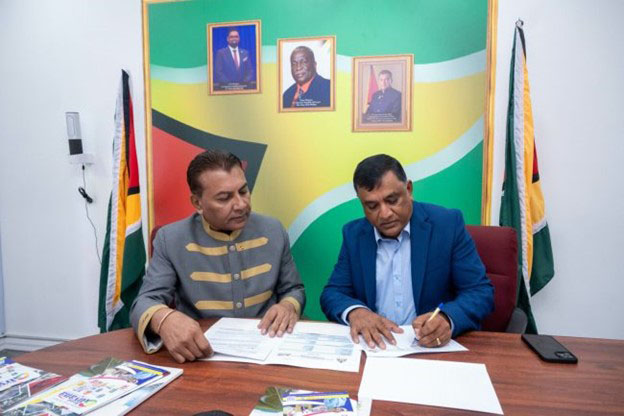Chief Executive Officer of Professional Waste Solutions Inc (PWSI) Mahendra Jettoo has denied allegations that environmental impact assessments or community consultations were neglected in the development of the Coverden oil and gas waste treatment plant.
“The EPA would not have granted us approval if we hadn’t met all the necessary requirements,” Jettoo asserted. “Four years ago, the EPA conducted a meeting with the community to discuss the project. We are committed to following environmental regulations and have received approval from both the EPA and the Ministry of Housing. Local residents have also given their consent. It’s only now that the project has been officially launched that some concerns have surfaced. We hold a local content certificate, are a locally based company, and are dedicated to creating jobs for the community while adhering to all regulatory guidelines.”
There is growing apprehension among residents and representatives over the project’s environmental and social implications, as well as the transparency of its approval process, which has sparked intense debate.
Alliance for Change (AFC) Advisor on Oil and Gas Dr Vincent Adams, who is the former executive director of the EPA, voiced significant concerns during the party’s press conference yesterday. Dr Adams, who has deep personal and familial ties to the nearby Soesdyke area, criticized the lack of visible information and expertise associated with PWSI. He questioned how the government could have approved an agreement with a company that appears to lack the technical qualifications necessary for managing such a hazardous and complex operation.
“This project raises serious concerns,” Adams stated. “The company’s website is sparsely populated and seems hastily assembled, with empty photo blocks and only two listed personnel: CEO Mahendra Jettoo and General Manager Ashley Jettoo. Their technical credentials are not detailed. Unlike a timber-cutting operation, this facility involves high-risk chemicals and high temperatures. There is no evidence of an Environmental Impact Assessment (EIA) or necessary permits, despite the facility already being built. This lack of technical expertise and regulatory oversight is troubling. In my experience managing a waste management complex, we required engineers with advanced degrees in chemical engineering. It’s alarming that the project appears to have been approved without proper resident engagement, setting a concerning precedent that needs to be addressed immediately.”
Residents of Coverden have echoed these concerns. Among them is community activist Penelope Howell, who has written to the EPA expressing dismay at the lack of community involvement in the project’s approval process. Howell’s letter highlighted the absence of environmental and social impact studies and questioned whether local stakeholders were adequately consulted before the announcement.
“I have repeatedly tried to contact Professional Waste Solutions Inc to understand the project better, but my efforts have been unsuccessful,” Howell wrote. She raised several pressing questions: How will this plant impact the community? Were proper environmental and social impact assessments conducted? What kind of public liability insurance will be provided? And importantly, how will the project affect local jobs and the environment?
The Department of Public Information (DPI) announced on August 15 that the agreement for the waste treatment plant was signed by Senior Minister within the Office of the President Dr Ashni Singh and handed over by Guyana’s Chief Investment Officer, Dr Peter Ramsaroop. According to the DPI, the plant is expected to create over 40 jobs and align with the government’s commitment to sustainable development, particularly in meeting the United Nations Sustainable Development Goals (SDGs).
Dr Ramsaroop emphasized that the plant will use non-incinerator technology to process oil and gas waste, converting it into reusable oil and byproducts such as ‘slag,’ which is claimed to be suitable for landfill disposal and block-making. This technology, he asserted, is a step towards achieving cleaner industrial practices and positioning Guyana as a leader in eco-friendly solutions.
However, critics argue that the government’s narrative of sustainable development and green technology does not address the broader implications for the local community. Audreyanna Thomas, another Coverden resident, expressed deep frustration over the project’s potential conflict with the community’s development plans. Thomas highlighted the potential impact on local agricultural and tourism initiatives, questioning the alignment of the waste treatment plant with the village’s long-term economic and environmental goals.






